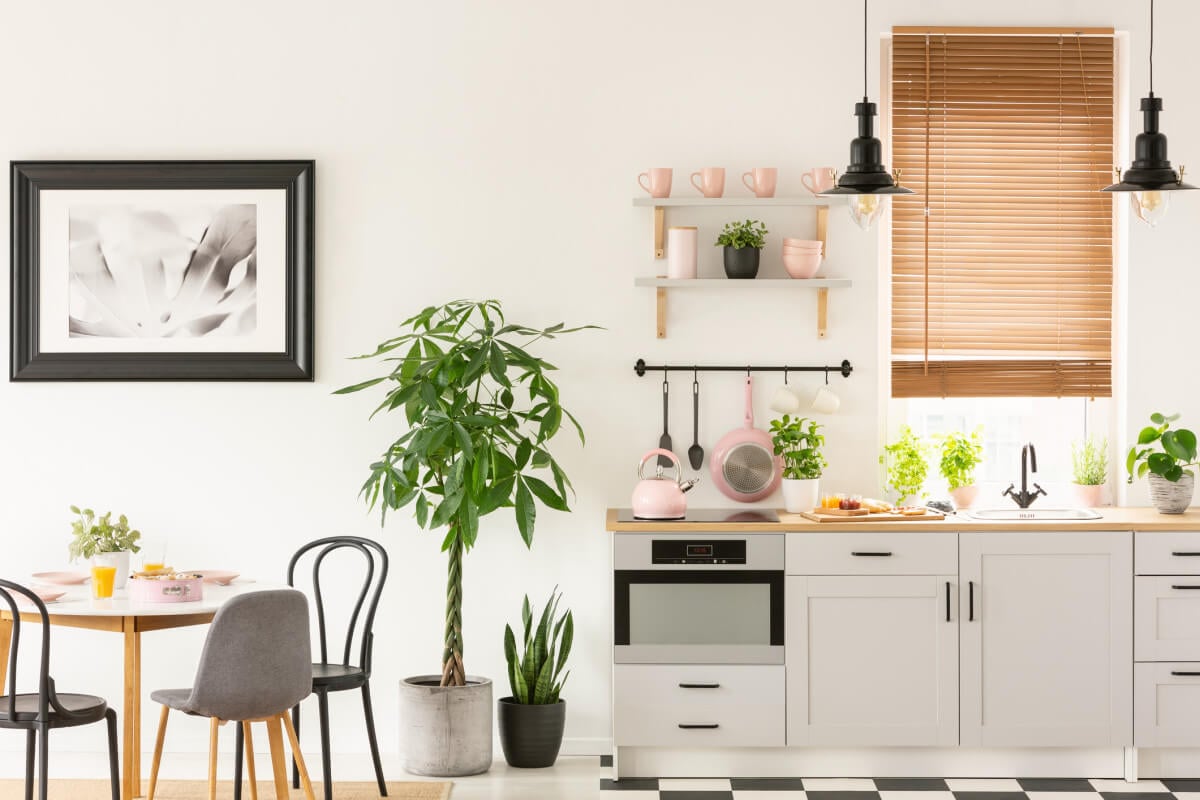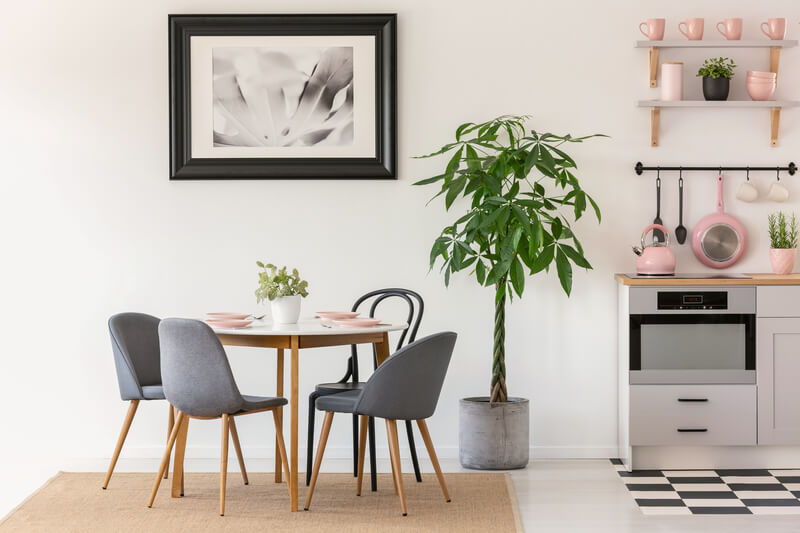What is Feng Shui?
Chances are you’re already familiar with Feng Shui. Originating in China, its philosophy is an ancient system of laws that has morphed into modern-day art in the Western world. Those laws govern the spatial arrangement of a room or design of a building to harness the flow of Qi, or energy. (It’s also a useful way to relieve cooking stress!)
Feng Shui directs us to position particular pieces of furniture or other objects in a specific direction to harness good energy and establish harmony with the natural world. In short, we create “good vibes” through the practice of Feng Shui.
The essential principles of Feng Shui include: the commanding position, the bagua, and the five elements.
The commanding position is the spot in a room that is furthest from the door but not directly in line with it. It’s the area in which you spend most of your time, and there should be a clear line of sight between it and the door.
The bagua is like an energy map representing different life circumstances, such as family and career. Each area has a color, season, shape, number, and element.
The five elements are earth, water, fire, metal, and wood. They come from the Taoist tradition, and in Feng Shui they’re used to establish a completely balanced, interrelated system.
Creating Good Feng Shui in Your Kitchen
Feng Shui seeks to enable not just the flow of energy in a room, but its positive qualities too. The kitchen is one of the most important rooms in Feng Shui, given that it’s an area of our home in which we tend to spend a great deal of time. It’s a central gathering place for the family and the site where we prepare the food that nourishes our bodies. Considering that, it makes sense to give attention to the flow and quality of energy in the kitchen.
The primary purpose of the kitchen in Feng Shui philosophy is to support good health. Therefore, we want to create a space that cultivates this following basic Feng Shui principles.
Fire is the kitchen’s element so a general rule of kitchen Feng Shui is to place your stove in the commanding position, since its cooking function serves the kitchen’s primary purpose. Using resources equally is an interesting principle, suggesting that you use all stove burners (rather than favoring one) on a rotating basis. It symbolizes opportunities in life, so to neglect using some burners represents missing out on or not identifying occasions in which to expand your life.
If You Can’t Take The Heat…
The elements help us understand how plants fit into all of this. Plants represent the wood element, and since wood feeds fire, Feng Shui advises against having many plants in the kitchen. A few carefully selected plants in moderation are okay. An excess can drive the fire element up and create an imbalance. If we look at the properties and effects of fire, such as heat and destruction, we can understand how too much hot energy in the kitchen would affect our individual energy. Never has the maxim if you can’t take the heat, get out of the kitchen been more relevant!
Best Plants for Kitchen Feng Shui
Given the power of plants to breathe life into empty spaces, you wouldn’t think there should be any bad luck plants in Feng Shui. A Feng Shui kitchen should be filled with plants of all species, shouldn’t it? In this case, it’s not only what but how many. As we learned, too much of the wood element can impact the fire element and disrupt your kitchen’s good vibes.
Bad luck plants in Feng Shui include tamarind, cotton, babul, and mehendi. It’s unlikely you’d have any of those in your home to begin with. But dead plants are also bad luck, so don’t leave them lying around too long.
Chamomile
Chamomile’s auspicious energy draws good energy into your kitchen (and your tea!). In Feng Shui, Chamomile is known for bringing forth money and good luck. Place it on a countertop or in the center of your table or island in the southeast corner of your kitchen. Chamomile plants love sunlight and moist soil.
Fruit & Citrus Trees
This gem literally bears fruit! Fruit trees are believed to help harness the energy of wealth, abundance, prosperity, health, and good luck. Place it directly in front of a sunny window so it receives full exposure, and in a space large enough to accommodate its growth.
Lavender
Besides being beautifully aromatic, lavender holds an energy that supports greater wellbeing. Place it in your kitchen to cultivate fidelity and commitment in relationships, calm emotions, and strengthen health. For relationships, position a lavender plant in the northeast area of your kitchen. To support health, place it in the west. Lavender enjoys full sun. Water it sparingly and prune its blossoms to encourage new growth.
Chinese Money Plant
As if there could ever be a plant more lucky than this one. It’s right on the money as far as positive vibes go. The Chinese money plant brings forth wealth, prosperity, money, and good luck. Place it in the southeast corner of your kitchen or near your stove. Medium to low-light exposure is best, and allow for drainage and dry soil between waterings.
Basil
Vibrant green, fragrant, and edible. Basil is not only gorgeous for sprucing up your kitchen and bringing flavor to your food, it brings good energy too. Position a basil plant anywhere in your kitchen to boost overall positive energy. Place it in the north for career luck or in a western spot for good health. Basil appreciates full sun, moist soil, and regular pruning.
Mint
Like basil, mint leaves are fragrant and bestow a verdant green to your kitchen. Its fresh scent and bitter flavor makes it great for health in general. In Feng Shui, mint brings wealth, prosperity, and luck. Position it in the southeast corner of your kitchen and ensure the soil is consistently moist. Mint likes full sun to partial shade and regular pruning.
Bamboo
Bamboo is a well-known plant for cultivating wealth, money luck, and prosperity. It also inspires an upward moving energy, leading to greater awareness and consciousness. However, some experts say that bamboo stalks must be in odd-numbered groupings for good luck. Even numbers may bring bad luck.
Bamboo is probably the most low-maintenance thing in your kitchen. It likes bright light but does well in low light too. Feed your bamboo plant clean water and ensure you regularly change the water too.
What Else is Feng Shui-able?
Your kitchen isn’t the only room in your home that could benefit from Feng Shui practices. The bedroom is another place you spend a great deal of time, and in a vulnerable sleeping state no less! Plant-ify your vanity, your ensuite, and more with plants specifically chosen for their Feng Shui benefits and know that you’re also helping to keep the air in your home clean.
Got post-holiday chaos in your kitchen? Grab 7 useful tips on how to calm things down and get your kitchen back to normal after the holidays.
For more great kitchen tips and awesome deals on exclusive kitchenware, join our Insider's Club.
From our kitchen to yours, enjoy Feng Shui-ing your kitchen with leafy love!




